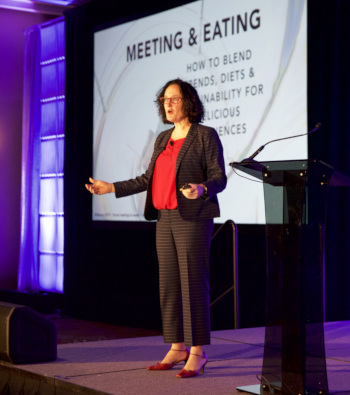F&B With Tracy Stuckrath: From COVID to Food Allergies and Beyond
Buffets? Gone. And don’t even think about a donut wall!
The meetings F&B environment has been disrupted flatter than a collapsed souffle, but that doesn’t mean you need to let the air out of your culinary programs.
Tracy Stuckrath, owner of thrive! meetings & events, is the foremost expert on food allergies in the meetings and conventions environment, and has extended her knowledge to operating in the COVID-19 environment. This Meetings Today Podcast with Vice President & Chief Content Director Tyler Davidson gets Stuckrath’s take on how to manage your post-shutdown culinary programs, what to ask venues and attendees, and the life-and-death matter of food allergies.
Listen to this Meetings Today Podcast to find out more.
See all of our coronavirus coverage.
Enjoying this episode? View more episodes of the Meetings Today Podcast!
Read the transcript below:
[Start transcript]
Tyler Davidson: Hello, and welcome to this Meetings Today podcast. I'm Tyler Davidson, vice president and chief content director for Meetings Today. Joining us today is Tracy, president and founder of thrive! meetings & events. Thanks for joining us, Tracy.
Tracy Stuckrath: Thanks for having me. Tyler. I'm excited to be here.
Tyler: Excellent. And you know we've worked together for so long and you've really established, through your experience and expertise, your standing as the foremost food allergies expert, I would say in the meetings F&B world.
But now, since COVID-19 has started, I'm not sure if that is top of mind with people. There are a lot of other issues such as a sanitary needs and social distancing. So why don't you tackle that? Why are food allergies still important, and what are you seeing in this new environment right now?
 Tracy: Yeah. Food allergies are always going to be important, and actually, dietary needs in general. And when I typically talk about dietary needs, I do break it up into four categories of food allergies, religious-based practices, lifestyle preferences and choices, as well as other medical needs.
Tracy: Yeah. Food allergies are always going to be important, and actually, dietary needs in general. And when I typically talk about dietary needs, I do break it up into four categories of food allergies, religious-based practices, lifestyle preferences and choices, as well as other medical needs.
(Photo: Tracy Stuckrath, president and founder of thrive! meetings & events)
No matter when we're going to serve food, these are still very, very important to consider, because you're providing a meal to someone who could potentially die if you serve them something they can't eat.
So even when we're doing limited service, or hotels and convention centers are minimizing their menu options, they still need to consider this because it is life and death, and COVID has not been proven to be passed through food and beverage.
And so we need to take the precautions that we need to do on social distancing and serving and things like that, but we also must still consider food allergies.
Tyler: And, I would say, the incubation period is not any 10 days or two weeks; depending on their food allergy, they could get very seriously ill almost immediately and then have very, almost catastrophic health problems right there where they're serving the food, right?
Tracy: You are so right. I mean, an allergic reaction can happen within two minutes to two hours of ingesting a food, and some people also have reactions when they breathe in the protein of a food or they touch the food. So if you and I are at a reception and I was allergic to peanuts, and you just eat peanuts out of the jar that were served at that buffet. Then I could potentially have an allergic reaction.
So it depends definitely on each individual person, but it could be fatal within two minutes.
Tyler: Yeah. And let's really get back to all of that, because I'm sure you'll join me in just really emphasizing to meeting planners, don't forget about food allergies in this post-shutdown environment while you're thinking about social distancing, what the food service is going to look like.
You are an expert on all things meetings and events F&B, so what are some of your thoughts on the post-COVID environment, what you're seeing out there, and options for planners?
Tracy: Yeah, it is definitely changing, adding some more things to our plate—pun intended—as we plan event food and beverage, and we're talking about social distancing.
A lot of questions that I get are, 'How are we going to do receptions? Are buffets gone forever?' One chef, [was] like, 'Donut walls are gone! We're not bringing them back.' And, so some people are going to be really upset about that.
Tyler: Homer Simpson would be very upset.
Tracy: He would be very upset about that.
But I think we need to think about, when we're looking at our room designs, and how do we put all the people in the same room at one time? Can we do that?
So I like to compare it to school lunch programs, right? Tyler's class goes at 11:30 and Tracy's class goes at 11:45, and Michelle's class goes at noon, and so you do those rotations. So, that's a way to contemplate staggering people in for your different lunch times or lunch periods, basically.
But buffets I think are definitely going to go away for a while. And when they do come back, it will be served by an attendant. So, no more double-sided buffets, which help us get through our lines much faster—we always hate standing in a single line. But it will be a single line for a while, and your servers are going to be gloved and masked in personal protective equipment.
I think you also might have to spread the buffet out. Typically, in our buffets, the shaping dishes are right next to each other one after the other. And I think we're going to have to put some social distancing between those chafing dishes and to spread people out as they go through that buffet, if they do.
But I think, for the time being, it's going to be boxed or bag lunches. Somebody showed a really cool bento box idea on Instagram. And I also think, if we do have some sort of buffet, action stations are going to be with plexiglass shield in between the attendee and the server, potentially.
Tyler: It almost seems like the easiest solution and I even...We've done stories with Wolfgang Puck Catering, and they, too, talk about boxed meals, and in that case an attendee can pick up the box and go out on the lawn and properly socially distance. That seems like just the simplest easy answer right now.
Tracy: I think it is, but for that scenario, you also have to look at the space that you have. So, do you have outdoor space. Right now, in North Carolina, it's 100 degrees outside—you really don't want to go put people outside in 100 degree temperatures, and as we get into the fall when meetings look like they're starting to come back, that's going to start to get chilly temperatures again. And so you really can't send people outside.
But look at the different space opportunities that you have. Don't look at them as constraints, but how can you get flexible with your space, and properties are gonna have to look at this stuff differently. One property said, 'Look at that meeting space, that one room that you hate to sell. Liven in up, bring it to use, right? That's something that you can do.
The other option, too, when you're doing plated, is you can serve them with plate covers. Think about when you bring in food from when you're in room surface, right? It comes with that silver plate cover. And you do plated meals with those plate covers. And I'm looking at a couple of really good...looking into ideas on how to get sponsorships and things with this food and beverage—get fun with it and make it not so sterile.
Tyler: Yeah, there really is a demand to liven it up, because food and beverage presentations are such a huge part of the industry. That's how you really make an impression. I don't know what the statistics say. but I know from personal experience, if the food is blah at an event, that's like the thing the attendees remember the most about the event?
Tracy: Yeah, they do. I mean, 'Oh, that was so good. Do you have that?' And, 'Oh, no, my God, that was horrible. I would never take an event back there.' And so we as planners have to partner with our food and beverage providers to really create tasty food that meets everybody's needs, as well as make it delicious on the eyes when you're serving it,
Tyler: And creative and appealing visually, too, I'm sure.
Tracy: To me, that's a great opportunity for all of those event designers out there, and catering companies that do that for a living when we're not inside a hotel. So how can you get really creative with the displays that you're doing that add punch in color and fun to it.
[Related: Social Distancing and F&B: 10 Catering Considerations for Outdoor Events]
Tyler: And then I know, we mentioned earlier, too, that I am noticing a lot of venues and caterers really emphasizing outdoor F&B events, which of course is necessitated by a meeting in a nice-weather area. But I know that we just got some information from Salamander Hotels and Resorts kind of launching a whole initiative around that concept. So, I'm guessing that's going to be a big seller, so to speak.
Tracy: Yeah, I definitely think so. And it actually helps a lot because with meetings, we're always sitting inside a hotel room and typically with four walls and no windows, and so getting people outside for lunch is a great opportunity because, Mark Cooper introduced me to this term—from IACC, yes—'forest bathing.' And it came up from China or from Japan and you basically go into the forest or into the woods or nature, basically, without your technology and just bathe in the glory of that.
Taking events outside and allowing people to get that fresh air; it's going to help them be more attentive. It's going to help them reinvigorate...I think it'll really add an extra element to your event. But, with that being said, we have to have backup scenarios. Whenever you have an outdoor event, you also have to have your contingency plan.
So, like here in North Carolina, it was an absolutely gorgeous day yesterday and at three o'clock the skies just broke out. It was a torrential downpour for a good hour. And if that's during the middle of your lunch hour, what are you going to do?
Tyler: You're gonna run for cover, I guess. It's good to have a plan B. And I promised earlier that we are not going to give short shrift to food allergies and preferences. So, why don't you give our listeners some really top line things they need to think about in relation to that, and also where they can find out more about what you do and your company, to get more resources.
Tracy: Thanks, Tyler. As a culinary concierge, I help planners look through their menus and design their menus so they meet multiple dietary needs, and this is really, really important when you think about what we're doing, because one of the biggest complaints I hear from planners is that, 'How do I accommodate all these needs within one budget,' right? And it can be very daunting.
My client in January—we had 600 attendees with 200 of them with dietary requests. And, working with the convention center that we had and working within those dietary needs parameters, we were able to design a buffet that we only had to present 35 personalized plates, and everyone else was able to walk through the buffet, including the 100, vegans and vegetarians.
And it's funny, the chef was like, 'Well, if we put the vegan stuff on the buffet, then everybody will eat it.' And I'm like, 'Well, that's kind of the point.'
Everybody can eat vegan food unless it's got an allergen in it that they can't consume. So, looking at it in that perspective; but I think food allergies is...the top eight allergens are wheat, soy, milk, eggs, tree nuts, peanuts, fish and shellfish. And the majority of those are in a lot of the foods that we serve, for breakfast and lunch and for all of our meals. And so when we look at catering menus, you typically don't see those labeled.
So, my first tip is that you need to be asking what the hotels have done in the past that meet multiple needs. Chef Murray in Toronto—we've been talking since COVID—and he is designing his menus free of gluten and free of dairy from the get-go now. So you can actually just add those in if somebody wants them. So it's easier for him then to design menu for a lot more people with that in mind up front.
You also need to know the dietary needs of your attendees, and that means asking the right questions. And that means, do you have a food allergy that is life threatening, and you have other dietary needs that we must consider?
A majority of chefs are going to consider any dietary need an absolute necessity because they don't want to cross-contaminate. They don't want to make anyone ill. But we need to collect the information so that you, who does have an anaphylaxis reaction to shellfish or peanuts or garlic or something like that, gets a personalized plate.
We may not be able to eliminate garlic from every single meal function, so we're going to give Tyler a personalized plate. And you have to communicate that information way up front, so that the meals can be designed.
[Related: Wolfgang Puck Catering Explores the Post-Coronavirus Shutdown Events F&B Experience]
Tyler: And then I would assume a big part of this, too, is of course the outreach to attendees before they even arrive just to make sure that everyone states any allergies or preferences they may have.
Tracy: Definitely ask in advance when they're registering. One of the things that I talk about is that events food safety—food allergies comes under food safety as well as COVID—right? And, everybody has a responsibility in that, and that is an attendee has a responsibility to communicate their needs in advance.
The meeting planner has the responsibility of communicating to the attendees, 'This is how we're going to handle food and beverage, this is what is designed for you,' but a meeting planner needs to talk to the hotel going, 'What are your capabilities? How can we do this?'
And then everyone in the hotel, from the CSM to the sales manager to the chef and the line cooks, the banquet captains and the servers, needs to understand their role in providing a safe experience. And that goes all the way to the server who is—hoteliers, if you're listening to me, or listening to Tyler and I—is that, they're your front-facing person to that diner, and if they don't understand what you're serving, or what they're serving to your customers, that doesn't bode well for a good impression on your attendees about your property.
Training them is important.
Tyler: Well, thanks for joining us, Tracy. Where can people find out more about thrive! meetings?
Tracy: Yeah, my website is thrivemeetings.com, and you can find information on the services I provide, including culinary concierge and food audits. And on Instagram, I'm tstuckrath. So t and then s t u c k r a t h—that's Instagram and Twitter.
And in the last month because of COVID, I am putting together a podcast I've launched a podcast called 'Eating at a Meeting.' And also with that podcast, I have created a Facebook group, so people can go to that Facebook group, Eating at a Meeting, and we'll be talking about everything about food and beverage, from farmers all the way to the convention centers and hotels.
Tyler: You are a media powerhouse now, Tracy.
Tracy: I'm trying, Tyler! I don't know what else to do!
Tyler: Oh, thanks for joining us. And that was Tracy with thrive! meetings. Make sure to check out her food and beverage tips and all sorts of resources. I personally can vouch for them; she is one of the leading lights in the meetings industry.
Thanks for joining us. And thanks for listening to this Meetings Today Podcast. I'm Tyler Davidson, vice president and chief content director.
Head on over to MeetingsToday.com and check out our Podcast section for myriad other podcasts with meetings and events industry thought leaders.
So, have a great rest of the day, wherever you are. And I know if you're like me, everyone is itching to get in the same room with each other and have face-to-face meetings again. So until then, have a good day. Bye.
[End transcript]
See all our coronavirus coverage.
Read next: Rosen Shingle Creek Chef Relishes Independence and Reveals Post-COVID-19 Thoughts





